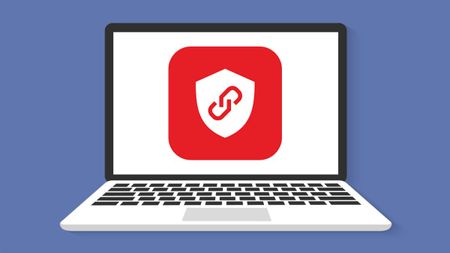

The best VPN, or virtual private network, is a wonder of security that works to keep you more secure, anonymous and unblocked when online – using protocols. That means you can have your identity hidden, internet activity masked and even appear to be somewhere you're not.
The way a VPN works is to assign you a new IP address which makes it look like you're somewhere else. This is done by routing your data through one of the VPN service's servers located in a different location. All that data is encrypted, keeping it secure in transit. But how the process works and which is best depends on protocols. There are lots of these and they can get quite complicated so we're sticking to the five most common to explain what they mean to you.
PPTP protocol
The PPTP protocol, or point-to-point tunnelling protocol, is the oldest of the lot but because it works so well it's still in use. Thanks to its age - birthed in the nineties - this protocol is easy to set up and has near universal support.
While this isn't encrypted as standard it usually comes bundled with an encryption of 128-bit. But since it's not complex at its core, it can run really fast compared to new, heavily encrypted protocols. As such this is ideal for speed and works well at unblocking geo-blocked content like Netflix or BBC iPlayer.
L2TP/IPsec protocol
The L2TP/IPsec protocol, or layer 2 tunneling protocol, might not have a catchy name but it does have very strong security thanks to encryption support up to 256-bit AES. L2TP, commonly paired with IPsec, or internet protocol security, is also a goody but an oldie. This is widely supported but does have a downside as it only uses a small number of network ports. That means if you're in a country that blocks VPNs (using a VPN for China, is a good example), this protocol will be easily blocked.
SSTP protocol
The SSTP, or secure socket tunneling protocol, is great for defeating VPN blocking since it can use the common port TCP 443, which is the one most sites use. This is largely thanks to the fact that the VPN protocol was developed by Windows. As such it's limited mostly to Windows users and also could have a backdoor built in for government snooping – though there's no evidence to support this.
OpenVPN
The OpenVPN protocol is one of the best and most widely used out there as a truly open source beast that keeps growing and evolving constantly. This uses OpenSSL and TLS and is pretty much system agnostic, with no native support for any one type of hardware – meaning it'll work anywhere. This can also be operated over TCP port 443 meaning you can piggyback on HTTPS website traffic to evade port-based VPN blocking.
Sign up to the T3 newsletter for smarter living straight to your inbox
Get all the latest news, reviews, deals and buying guides on gorgeous tech, home and active products from the T3 experts
Since this is one that gets used by lots of VPN providers, as they create specific clients to work with it, you can get lots of benefits but it all depends on which service you go for.
IKEv2/IPsec protocol
The IKEv2/IPsec protocol combination is the birth child of Microsoft and Cisco and, as a naughties creation, is one of the newest. As such it's not the most widely supported, yet. Created with mobiles in mind this is able to keep the VPN up even when switching from Wi-Fi to mobile network connections.
Another big plus here is speed. This is one of the fastest VPN protocols available. So while you get excellent speed and stability, you have to keep in mind Microsoft and Cisco created this so perhaps they have backdoors built in.
VPNs with customised protocols
With the competition so intense between VPN providers, each one needs to outgun the rest with their protocol boasts. That usually comes in the form of letting you decide which protocol you want to use (T3's #1 favorite ExpressVPN gives you the option that include OpenVPN, L2TP and IKEv2) while others have developed their own in-house security protocols.
That might sound like you'll pay a premium, but even our highest-rated free VPN Hotspot Shield has produced its very own 'Catapult Hydra' for added security and faster connection speeds.
Read more:
- What is a VPN? How does it work and why do you need one?
- Are VPNs legal? (Spoiler alert...yes)
Luke is a former freelance writer for T3 with over two decades of experience covering tech, science and health. Among many others Luke wrote about health tech, software and apps, VPNs, TV, audio, smart home, antivirus, broadband, smartphones, cars and plenty more. In his free time, Luke used to climb mountains, swim outside and contort his body into silly positions while breathing as calmly as possible.
-
 How to watch FREE Super Bowl 2023 live streams online now - global channels explained
How to watch FREE Super Bowl 2023 live streams online now - global channels explainedLooking for a free Super Bowl live stream to watch the Philadelphia Eagles vs Kansas City Chiefs? Here are the best legal ways to tune in without spending a dime
By Sam Cross Last updated
-
 How to watch RuPaul's Drag Race season 15 online and stream new episodes every week from anywhere
How to watch RuPaul's Drag Race season 15 online and stream new episodes every week from anywhereA super sweet 16-drag queens contest to become the next superstar. Follow the fierce journey and find out how to watch RuPaul's Drag Race season 15 online and on catch-up
By Alice Marshall Last updated
-
 Jake Paul vs Anderson Silva live stream: how to watch the full fight online today, start time, PPV prices
Jake Paul vs Anderson Silva live stream: how to watch the full fight online today, start time, PPV pricesLive stream the fight from anywhere
By Kevin Lynch Published
-
 I tested the new iPad Air, and it's like a tablet and MacBook rolled into one
I tested the new iPad Air, and it's like a tablet and MacBook rolled into oneNow with an M3 chip and a new Magic Keyboard option, the iPad Air M3 promises to not only be the best portable tablet but a real mini laptop replacement, too
By Mat Gallagher Published
-
 Netflix's new show Ransom Canyon is coming for Yellowstone's lunch money
Netflix's new show Ransom Canyon is coming for Yellowstone's lunch moneyIt's precision-targeted
By Max Freeman-Mills Published
-
 10 best VPN services for the everyday user in 2025
10 best VPN services for the everyday user in 2025Boost your digital privacy and unblock content from around the world with a VPN, and check out my top 10 apps.
By Alice Marshall Last updated
-
 5 best Mac VPNs for your MacBook or iMac 2025
5 best Mac VPNs for your MacBook or iMac 2025Protect your Mac from malware and hackers with the best macOS-compatible VPNs
By Alice Marshall Last updated
-
 Do Macs have a built-in VPN?
Do Macs have a built-in VPN?Apple may be known for its secure devices, but we answer whether or not its Mac computers have a built-in VPN, or if you'll need to install a third-party provider
By Alice Marshall Published
-
 ExpressVPN review: T3’s pick for the best overall VPN
ExpressVPN review: T3’s pick for the best overall VPNExpressVPN retains its title as the overarching top dog in the war of VPNs thanks to its streaming unblocking prowess, excellent clients, an array of powerful security features
By Alice Marshall Last updated
-
 5 best BBC iPlayer VPNs in 2025
5 best BBC iPlayer VPNs in 2025Unblock BBC iPlayer, from anywhere in the world, with the help of a VPN
By Alice Marshall Last updated
-
 The best streaming VPN for unblocking your favorite platforms in 2025
The best streaming VPN for unblocking your favorite platforms in 2025Keep up with your favorite show with a streaming VPN
By Alice Marshall Last updated
-
 How to watch UK TV from abroad with a VPN including BBC iPlayer and All 4
How to watch UK TV from abroad with a VPN including BBC iPlayer and All 4Don't get locked out by pesky geo-restrictions. There's a simple solution to watching UK TV abroad with our handy guide
By Alice Marshall Published
-
 Bitdefender VPN review: Simplicity and speed
Bitdefender VPN review: Simplicity and speedBitdefender VPN comes from a huge name in security yet offers a very minimal and easy to use service
By Luke Edwards Last updated
